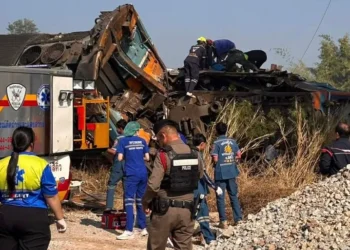A number of countries have sent their condolences as more than 800 people have been killed and 2,500 injured after an earthquake struck eastern Afghanistan.
The magnitude 6 earthquake hit four provinces in eastern Afghanistan around midnight on Sunday, with the rugged, mountainous region of Kunar the worst affected, triggering landslides and flooding.
The earthquake was shallow, taking place close to the Earth’s surface, which is known to cause greater destruction. Several aftershocks were reported throughout the night and into Monday morning, which could even be felt in the capital, Kabul, more than 100 miles away.
The epicentre of the earthquake was close to the bustling trade city of Jalalabad, close to the border with Pakistan. Swaths of the city’s buildings are low-rise and informal constructions, mostly made of concrete and brick, which are particularly vulnerable to earthquakes.
The Taliban Spokesperson, Zabihullah Mujahid confirmed that the death toll had exceeded 800 by Monday afternoon and that rescue efforts were continuing to recover those trapped beneath mud and debris.
However, those efforts were hampered as roads to affected areas were destroyed or blocked by rubble from the earthquake, and the terrain of the region is steep and treacherous.
The Foreign Ministry spokesperson in Beijing said that China mourns for the lives lost in the earthquake in Afghanistan and “our hearts go out to the bereaved families and the injured.”
The Spokesperson expressed belief that under the leadership of the Afghan government, the Afghan people will recover and rebuild from the disaster, adding, “China will provide help in light of Afghanistan’s needs.”
Indian Prime Minister, Narendra Modi said he is “deeply saddened by the loss of lives” and wished a “speedy recovery” to those wounded. “India stands ready to provide all possible humanitarian aid and relief to those affected,” he said in a post on X.

Azerbaijan’s Foreign Ministry also expressed “heartfelt condolences” to the victims. “Our thoughts and prayers are with the people of Afghanistan during this difficult time,” the ministry said on X.
Turkiye’s embassy in Kabul extended condolences to the Afghan people and said that it would closely follow developments.
Pakistani Prime Minister, Shehbaz Sharif expressed condolences and readiness to extend possible support.
Afghanistan is grappling with a severe economic crisis, exacerbated by the suspension of US foreign aid earlier this year and the forced return of more than 2 million Afghan nationals from neighbouring Iran and Pakistan.
According to the United Nations, more than half of Afghanistan’s 42 million population is already in need of humanitarian assistance.
Earthquake Death Toll Expected To Rise

However, the death toll is expected to rise significantly as local hospitals report being inundated with casualties and hundreds still remain unaccounted for.
Medics at the provincial hospital in Asadabad in Kunar described the situation as an overwhelming crisis, with new patients arriving every few minutes.
Afghanistan is prone to deadly earthquakes, particularly in the Hindu Kush mountain range, where the Indian and Eurasian tectonic plates meet.
A series of earthquakes in its west killed more than 1,000 people last year, underscoring the vulnerability of one of the world’s poorest countries to natural disasters.
A magnitude 6.3 earthquake struck Afghanistan on 7 October 2023, followed by strong aftershocks. The Taliban government estimated that at least 4,000 people perished.
The UN gave a far lower death toll of about 1,500. It was the deadliest natural disaster to strike Afghanistan in recent memory.
Brian Baptie, a seismologist at the British Geological Survey, opined that Afghanistan’s deadly quake was a product of one of the world’s most powerful and active seismic forces.
He notd that northeastern Afghanistan’s location in this seismic zone explains its “history of destructive earthquakes,” adding that the region has experienced more than a dozen magnitude 7 quakes since 1900.
READ ALSO: Women in Mining Urged to Embrace Responsible Practices for Growth























